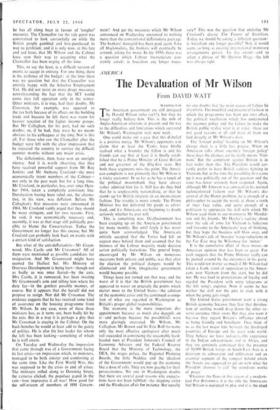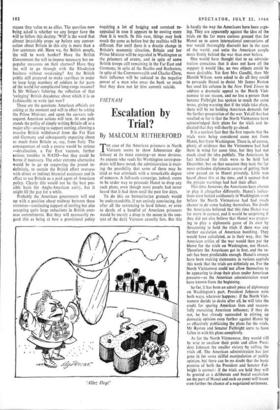The Devaluation of Mr Wilson
AMERICA
From DAVID WATT
WASHINGTON
TIE American government are still intrigued by Harold Wilson (who isn't?), but they no longer really believe him. This is the nub of Anglo-American relations at present and the key to the difficulties and limitations which surround Mr Wilson's Washington visit next week.
One could make out a case that this disbelief is a positive mercy. Mr Wilson's opponents can claim that at least the Yanks have finally realised what a bounder the fellow is and his friends can say that at least it is finally estab- lished that he is Prime Minister of Great Britain and not governor of the fifty-first state. But both these arguments miss the point. The Ameri- can complaint is not primarily that Mr Wilson is a tricky customer. In so far as he has a touch of the political mountebank they have always rather admired him for it. Still less do they find that he is unpleasantly nationalistic, or that he stands up for British interests in an inconvenient fashion. The trouble is more simple. The Prime Minister has not delivered the goods as adver- tised, and tl.e Americans are beginning to doubt seriously whether he ever will.
This is something new. Disillusionment has been creeping up on the American government for many months. But until lately it has never quite been acknowledged. The Americans entirely accepted that the Tories had left an augean mess behind them and assumed that the thinness of the Labour majority made decisive action politically hazardous. The general hope, encouraged by Mr Wilson on numerous occasions both private and public, was that after the election the political dangers would be eliminated and firm, imaginative government would become possible.
Things have not turned out that way, and the worst of it is that the British government has appeared to waver on precisely the points which matter most to the United States—the solution of the economic crisis and the continued assump- tion of what are regarded in Washington as Britain's proper global responsibilities.
The economy is the more important dis- appointment because so much else depends on it—and perhaps because the possibilities were more glaringly overrated. Mr Wilson, Mr Callaghan, Mr Brown and Sir Eric Roll (to name only the most effective apologists) after much toil succeeded in convincing the reasonably hard- headed men at President Johnson's Council of Economic Advisers and the Federal Reserve Board that the Ministry of Technology, the DEA, the wages policy, the Regional Planning Boards, the little Neddies and the idealism of the Government would pep up the economy like a dose of salts. They are now paying for their persuasiveness. No one in Washington doubts that there are several good reasons why expecta- tions have not been fulfilled—the shipping strike and the Rhodesian affair for instance. But equally no one doubts that the main causes of failure lie elsewhere. The muddled and piecemeal fashion in which the programme has been put into effect, the political vacillation which has undermined the incomes policy and the failure to make the British public realise what is at stake—these are not good reasons at all and most of them are laid directly at Mr Wilson's door.
The 'foreign policy' heading on Mr Wilson's charge sheet is a little less precise. When an American talks about anyone's 'foreign policy' these days the chances are he really means 'Viet- nam.' But the complaint against Britain is in fact wider than this. The President would cer- tainly prefer to have British soldiers fighting in Vietnam, but at the time the possibility first came up it was politically out of the question and the issue has never seriously been reopened. Again, although Mr Johnson was annoyed in his normal technicoloured fashion over Mr Wilson's dis- avowal of the Hanoi problem, he is enough of a philosopher to accept the words at about a tenth of their face value, and quite enough of a politician to appreciate the skill with which Mr Wilson used them to out-manomvre Mr Mendel- son and his friends. Mr Healey's tacking about over the sale of arms for Vietnam is ludicrous and tiresome to the Americans' way of thinking, but they hope the business will blow over, and Mr Wilson's talk of 'massive' troop reductions in the Far East may be Wilsonese for 'minor.'
It is the cumulative effect of these moves on American opinion that has been so great. For each suggests that the Prime Minister really can be pushed around by the extremists in his party. This would not matter so much if Mr Wilson had taken a frank stand of opposition to the Ameri- cans over Vietnam from the start, but he did not. He was loud in protestations of loyalty and regaled the President with witty telegrams at the left wing's expense. Now it seems he has neither the skill nor the guts to stick with it when the going gets rough.
The United States government want a strong British economy because they fear that devalua- tion of sterling would drag down the other re- serve currency (their own). But they also want it because they regard Britain's influence abroad as being friendly and beneficent. They think of us as the last major link between the developed countries of Europe and the great wide world. They believe we have indispen,able experience in the Indian sub-continent and in Africa, and they are genuinely convinced that the presence of 50,000 British troops in South-East Asia is a deterrent to subversion and infiltration and an essential segment of the rampart behind which the Asians are supposed to get on with what the President chooses to call 'the wondrous works of peace.'
Whatever the flaws in this vision of a modern- ised Pax Britannica. it is the role the Americans feel Britain is equipped to play and it is the chief reason they value us as allies. The question now being asked is whether we any longer have the will to follow this destiny. 'Will' is the word that almost invariably crops up before any conver- sation about Britain in this city is more than a few sentences old. Have we, the British people, the will to work harder? Have the British Government the will to impose necessary but un- popular measures on their electors? Have they the will to go through with the Rhodesian business without weakening? Are the British public still prepared to make sacrifices in order to keep large numbers of soldiers in far parts of the world for complicated long-range reasons? Is Mr Wilson's faltering the reflection of that 'swinging' British decadence about which it is so fashionable to write just now?
These are the questions American officials are asking at the moment and will in effect be asking the Prime Minister; and upon the answers sub- sequent American actions will turn. At one pole stands the policy of simply writing Britain off as a major ally—ceasing to support sterling, allowing a massive British withdrawal from the Far East and Germany and subsequently expecting about as much from Britain as, say, from Italy. The consequences of such a course would be serious —devaluation, a Far East vacuum, further serious troubles in NATO—but they could be borne if necessary. The other extreme alternative would be to go on supporting the pound in- definitely, to sustain the British effort overseas with direct or indirect financial assistance and in effect to use Britain as a paid agent of American policy. Clearly this would not be the best pos- sible basis for Anglo-American amity, but it might fill the gap for a while.
Probably the American government will end up with a position about midway between these extremes—continuing support of sterling but also accepting quite large reductions in British over- seas commitments. But they will necessarily re- gard this as being at best a provisional policy
requiring a lot of hedging and constant re- appraisal in case it appears to be costing more than it is worth. In this case, things may look much the same as before but the realities will be different. For until there is a drastic change in Britain's economic situation, Britain and her Prime Minister will be regarded in Washington as the prisoners of events, and in spite of some British troops still remaining in the Far East and Germany, in spite of the Beatles and Beefeaters, in spite of the Commonwealth and Charles Clore, their influence will be reduced to the negative power of a man who owes the bank so much that they dare not let him commit suicide.







































 Previous page
Previous page